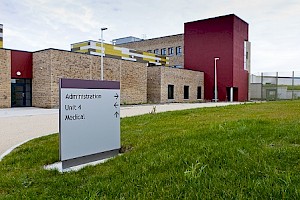Youth Justice
Ireland has a long history of poor responses to offending behaviour by children. A core strand to IPRT's work since its establishment in 1994 has been the promotion of a more effective youth justice system, with emphasis on non-custodial alternatives, diversion, early intervention and prevention strategies and programmes. Central to our work was ending the practice of detaining children in adult prisons, which was in breach of international human rights standards and a serious stain on Ireland's human rights record.
International human rights standards, and in particular the provisions of the UN Convention on the Rights of the Child, are clear that custody for children should only be used as a last resort and for the minimum required period of time. All efforts should be made to apply alternatives to detention to ensure that such a measure is only used in exceptional circumstances.
In Ireland, the Children Act 2001 recognizes the principle of detention as a last resort. The Act prohibits the imprisonment of children and the Criminal Justice Act 2006 makes provision for all children less than 18 years of age to be detained in Children Detention Schools. The detention school model is focused on a model of care, education, health and programmes that address offending, with improved outcomes for the young people, their communities and all of society. The Irish Youth Justice Service is responsible for the Children Detention Schools, within the Department of Children and Youth Affairs.
Following years of sustained advocacy by IPRT, along with many national and international bodies, in 2012 the detention of boys aged under 17 at St Patrick's Institution ended. In March 2017, a Ministerial Order ended the sentencing of children aged under 18 to adult prison in Ireland, and in April 2017, St. Patrick’s Institution was finally closed. Since September 2017 boys aged under 18 are no longer detained in the adult prison system.
IPRT continues to work towards progressive change in youth justice policies and practice, as well as engaging with wider policy and practice issues relating to youth justice, such as the provision of alternatives to detention, diversion and early intervention programmes.

IPRT welcomes new report on children and juvenile justice
22nd June 2009
IPRT today welcomed the publication of “Children and Juvenile Justice: Proposals for Improvements” by Thomas Hammarberg, the Council of Europe’s Commissioner for Human Rights.
"Problems for children in care": youth justice issues on RTÉ 'This Week'
21st June 2009
A report on RTÉ's 'This Week' looking at conditions for those in State care, particularly young offenders. IPRT Chair, Dr Ursula Kilkelly spoke on Youth Justice issues in Ireland.
Young People on Remand: Report
28th November 2008
The Minister for Children and Youth Affairs published a major report into the situation of young people on remand in November 2008.
National Youth Justice Strategy
31st March 2008
The National Youth Justice Strategy 2008-2010 was launched in March 2008.
Anti-Social Behaviour Orders
31st December 2006
This report gives a detailed overview of Anti-Social Behaviour Orders (ASBOs) which were introduced in England and Wales by the Crime and Disorder Act 1998, and have been available since April 1999.
Garda Youth Diversion Project Guidelines
31st December 2006
The evaluation report on the Garda Youth Diversion Projects, which suggests that a set of guidelines are required to develop a planned and strategic approach for the prevention of juvenile crime.
Lost in Transition: Barrow Cadbury Commission on Young Adults and the Criminal Justice System
30th September 2005
A report of the independent Commission on Young Adults and the Criminal Justice System, established by the Barrow Cadbury Trust.
Report of the Youth Justice Review
31st July 2005
This summary report delves into the Youth Justice Programme and lays out the weaknesses and strengths of the system. The report includes future proposals.
HIV/AIDS in Youth Custody Settings: A Comprehensive Strategy
18th June 1996
This report calls for comprehensive education as the first step to preventing HIV infection in young offenders.




